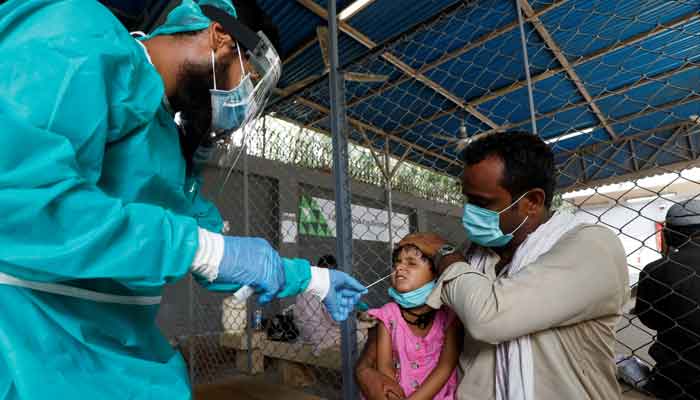COVID-19: The road to recovery
Dexamethasone suppresses the immune system, thus preventing the damage caused by cytokine storm
July 13, 2020

In a testament to the mismanagement of the pandemic, at official levels, Pakistan overtook Italy in becoming the eleventh country with the highest number of COVID-19 cases on July 10.
It is said that a crisis reveals a country in its true light. While COVID-19 has swung its scythe through the globe, it has highlighted the excesses of power and the depths of the desperation of patients.
While on the one hand, US President Donald J. Trump has bought the three month stock of the drug remdesivir leaving virtually none for the rest of the world, in Pakistan, there have been reports of artificial shortages created by hoarding of medicines and a thriving sale of drugs, medical equipment and blood plasma of recovered patients.
Is remdesivir the silver bullet against COVID-19?
Dr Tabassum Khan, chairman StratGurus Group of Companies, disagrees. “Remdesivir is an anti-viral drug which was unsuccessful in treating Ebola,” he said recently. “Two major studies have been published; the first study was published in The Lancet showing no improvement in recovery time or mortality.”
Read also: French expert warns full COVID-19 vaccine unlikely by next year
The second study, he added, published in The New England Journal of Medicine, showed shortening of the recovery time from COVID-19 by about four days. “The study was carried out on non-ventilated patients. The results have not been peer-reviewed, hence caution is required, but the cost-benefit ratio does not favour its use,” the doctor said.
In the absence of other options for the deadly virus, remdesivir has been approved for use by many states including Pakistan, Australia and the European Commission for the treatment of critically-ill patients.
But when a particular drug is touted as being effective, it tends to vanish from the domestic market and its price shoots up. When Sheikh Rashid, minister of railways was hospitalized for COVID-19, the remdesivir injection was not available even for Rs. 500,000, he told a press briefing. Rashid then thanked the chairman of the National Disaster Management Authority (NDMA) for arranging the drug.
Separately, the chairman of the Drug Regulatory Authority of Pakistan (DRAP) said remdesivir would be available within a month in the country because the authority has allowed two pharmaceutical companies to import the drug and has given licences to 14 manufacturers for producing the medicine locally.
This action comes on the heels of the Supreme Court directive, which had taken note of the profiteers hoarding life-saving drugs and equipment like oximeters and oxygen cylinders with a subsequent price increase.
Read also: Healthcare workers' infections jump from 5,000 to 6,000 in over two weeks
Apart from remdesivir, dexamethasone has been hailed as an “exciting discovery” for the treatment of COVID-19, which has also led to a shortage at pharmacies across the country.
Dexamethasone is a steroid for treating rheumatoid arthritis and asthma.
According to Dr Khan, a UK study revealed that whenever a foreign body, a bacteria or virus, enters the body the immune system creates antibodies to kill the bacteria. “Sometimes, the immune system’s response is exaggerated and the body releases too many cytokines (messenger cells) into the blood too quickly.” This cytokine storm, he explained, can occur because of an infection and can lead to high fever and inflammation and if it gets severe can lead to multiple organ failure.
Dexamethasone suppresses the immune system, thus preventing the damage caused by cytokine storm.
In patients with COVID-19, it has prevented one death out of three in those who are critically ill and are on ventilators. The study also found that in patients needing only oxygen support, it led to a 20% reduction in the death rate.
However, it must be kept in mind that it is not meant for every COVID-19 patient.
In those patients, who do not need any help with breathing, the drug may presumably increase the risk of death. This is possibly due to the suppression of the human immune system thus lowering the ability of the human body to fight coronavirus in the early stages.
With coronavirus cases surging in Pakistan, many have taken this as an opportunity to profit off the misery of others. Some recovered patients have started selling their blood plasma at exorbitant rates.
But how effective is blood plasma infusion?
According to Dr Tabassum Khan, when the virus enters the body it triggers a generation of antibodies. On recovery, these antibodies may still be circulating in the human plasma. “Convalescent plasma therapy for COVID-19 may offer a benefit. Although the recovered patients possibly produce high levels of antibodies which have the effect of neutralizing the virus and can remain in their system for some time,” he said, but added that the duration of the neutralizing impact is still not clear.
As a disorganized healthcare system, on the verge of collapse, struggles to cope with the rigours of the pandemic, citizen initiatives like the “Corona Recovered Warriors” groups have sprung up on Facebook. Here, a team of 33 volunteers provide information on medicines, hospitals, oximeters, ventilators, oxygen cylinders and injections.
These community support groups highlight the huge gap between demand and supply in the healthcare system. In the absence of a clear cut communication strategy from the government, citizen-led groups are performing a herculean task which Pakistan’s under-resourced and woefully inadequate healthcare system is unable to fulfil.
Usmani is a journalist and author. She tweets @MaheenUsmani











